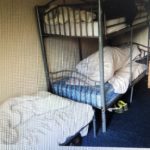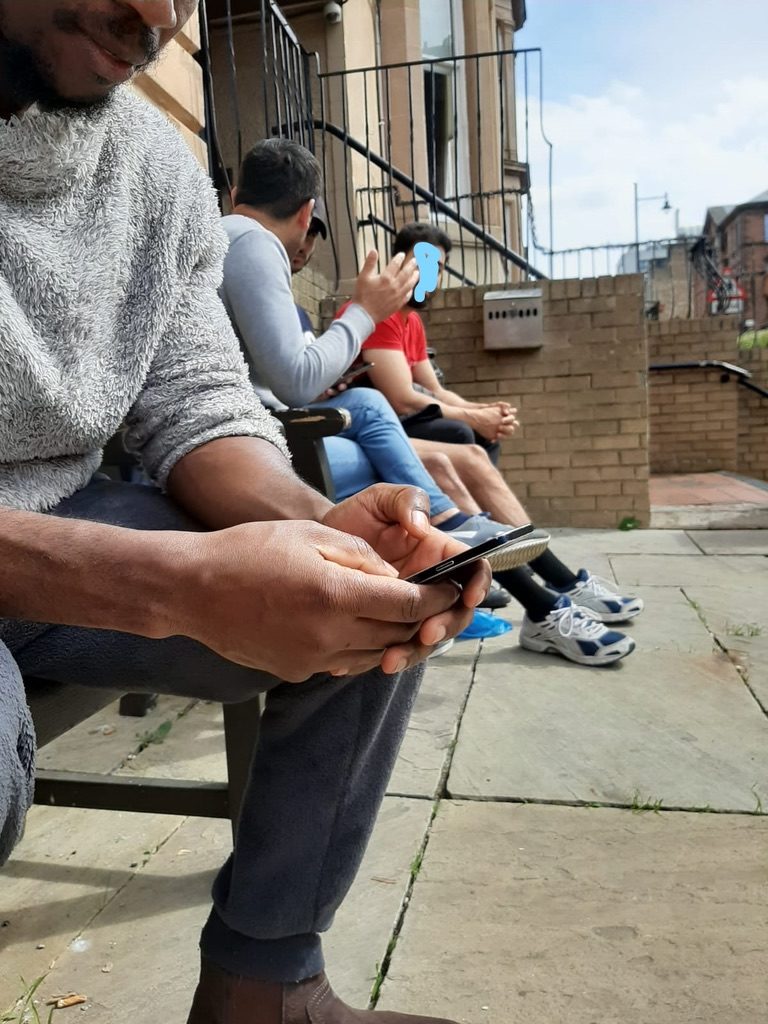John Grayson of South Yorkshire Migration & Asylum Action Group continues his exposés of conditions in Scotland, Ireland and other countries of Europe for asylum seekers in supposedly safe accommodation.
Scotland: the Mears group and its £500m asylum housing contract
In Scotland, as in the rest of the UK, the Home Office provision of asylum housing and asylum Initial Accommodation hostels for people waiting for outcomes of asylum claims, was privatised and outsourced in 2012.The international security company Serco, which also managed Yarl’s Wood detention centre, and its subcontractor Orchard and Shipman, were awarded the contracts in June 2012.
In January 2019, new 10-year AASC (Asylum Accommodation and Support Contracts) were awarded to start in September 2019, and the Mears Group won the £500m contracts for Scotland. There were around 5,000 people in asylum housing in September 2019 when they took over from Serco. John Taylor, senior operating officer for Mears Housing for all their asylum housing contracts, was returning to Scottish asylum housing, after being CEO at Orchard and Shipman under the Serco contracts.
Using Glasgow hotels
On 22 April 2020 the Guardian reported that Mears had moved more than three hundred people in asylum housing ‘from mainly self-contained apartments into Glasgow hotels over the past ten days’. Mears had leased seven city-centre hotels to accommodate people. The transfer to the hotels did not go smoothly. A Twitter message to Robina Qureshi of Glasgow based Positive Action in Housing on 1 May, from a Mears staff worker said:
‘I was working in one of the serviced accommodations and were emptied over the month of April. Once the people were moved there were times when there were 4-5 people in a welfare vehicle moved at the same time. The people were lied to and told they were moving to long-term accommodation. We had people coming back saying they were not happy with the food and could be up to thirty people in queues at Breakfast/Lunch/Dinner times when they were first moved. Furthermore, all companies have been refused payment for the last month of stay for the asylum accommodation, with no grounds given.’

Ivor’s testimony
Ivor is a professional worker from the Middle East; he is in a Mears hotel in the centre of Glasgow. I spoke to him (through an interpreter) on Saturday 18 April.
‘I am in a fairly small hotel with around fifty other people. It’s not bad, food is ok. I am told there are no more houses for asylum seekers in Glasgow. They clean the room and bathroom once a week and empty the rubbish bins every day. We have TV in the rooms. Wi-Fi quality is very good. Nobody shares rooms here, but I am sure in some of the hotels people have to share rooms.
I think Mears have seven hotels in the city centre. One 8-storey hotel has around 150 asylum seekers in there, wandering round the city centre you see all the asylum hotels. In my hotel there are Kurdish people from Iran and Iraq, Arabic, and Sudanese people. There are three women in this hotel, and over forty men, no children. I have heard of children in some of the other hotels but there are only a few, I think. There are two washing machines available for fifty people.’
Ivor continues: ‘What surprised me is that Mears and the Home Office do not check on people in the hotels at all. I have never seen anyone from Mears in here. You simply leave your key at reception when you go out and pick it up when you return. I have never been told of any medical services available.
 We have no personal translated detailed information about Covid-19 here just one notice in reception for all of us from Migrant Help with different languages.’
We have no personal translated detailed information about Covid-19 here just one notice in reception for all of us from Migrant Help with different languages.’
All seven Glasgow MPs protest about Mears
The Guardian on 22 April carried interviews with people in the hotels: ‘Everyone here is feeling bad, and worried about the virus. There is no social distancing in the meals area and all the food is uncovered. I would like to buy some juice or fruit for my room, but they told me my [Home Office issued] card won’t work anymore.’
Another interviewee, M, said: ‘It’s impossible not to get close to people when you’re in the lift or getting your food, and there are two bottles of hand sanitiser among 80 people. There are many Muslims here and Ramadan begins in two days. The evening meal stops at 8pm, so what happens when we start fasting?’
The Morning Star reported on 24 April: ‘Seven Glasgow MPs have written to the Home Secretary urging action to ensure that asylum-seekers’ lives are not put at further risk, following reports they have been forced to walk for miles to access electricity and have had financial support withdrawn’. ‘Vulnerable women have told the Star that they fear for their safety after being placed in rooms in close proximity to men’. According to the paper, ‘The parliamentarians also said that they wanted removals from flats to cease and action to ensure that all accommodation meets public-health guidance on social distancing, with financial support reinstated to everyone in the asylum system.’
The Scottish Refugee Council supporting people in hotels
The Scottish Refugee Council and other charities in Glasgow took to Twitter to pass on complaints to Mears about social distancing and reports of people sharing rooms in Mears Hotels.
On Twitter on 16 April John Taylor, chief operating officer of Mears, used the Mears hashtag to respond to the criticism of conditions in the hotels:
‘I read that you have been receiving increased calls from service users who are concerned about sharing bed spaces. I want to give my personal guarantee that we will never ask unrelated service users to share a room.’
Gary Christie, the head of policy at the Scottish Refugee Council, told the Guardian on 22 April:
‘People tell us they’ve been moved into hotels at very short notice and without a proper explanation of why they’re being moved, how long for, or what will happen next.’
 Ireland: The Direct Provision system and Covid-19
Ireland: The Direct Provision system and Covid-19
In Ireland the government oversees a Direct Provision (DP) system of asylum housing which started in 2000 and was the first totally privatised asylum housing system in Europe, comprising privately run hotels, hostels, even caravan sites provided by small business operators and hoteliers but also by large international companies like Aramark. Aramark is the largest prison catering company in the USA, and in 2018 had an approximately 50 per cent market share of the food services industry in Ireland.
 MASI (Movement for Asylum Seekers in Ireland) during the Covid-19 pandemic has been campaigning for safety and social distancing in the DP centres. On 11 April, after an asylum seeker contracted the COVID-19 virus, MASI issued a ‘ to COVID-19 in Direct Provision’ saying:
MASI (Movement for Asylum Seekers in Ireland) during the Covid-19 pandemic has been campaigning for safety and social distancing in the DP centres. On 11 April, after an asylum seeker contracted the COVID-19 virus, MASI issued a ‘ to COVID-19 in Direct Provision’ saying:
‘The government has effectively abandoned asylum seekers and left them at the mercy of greedy operators of Direct Provision centres.’
An Open Letter to Government mobilising academics and health experts
MASI organised and sent an ‘Open Letter to Government re. social distancing and direct provision’ on 31 March, which attracted signatures from hundreds of experts, health workers and academics, and stated:
‘We are specialists spanning fields of health systems, public health, social policy, law, human rights, migration and racism.
We write to express our utmost concern that the State is continuing at this time to require large numbers of people seeking international protection to live in shared bedrooms, and to share sanitary and eating facilities, within the direct provision system. This has prevented many people from socially distancing according to Government advice, with the aim of avoiding contracting COVID-19 and avoiding passing the virus on to others while they may be asymptomatic.
Many direct provision centres are in rural locations. An outbreak of COVID-19 within a centre, where people have not been in a position to socially distance themselves from one another, could spread rapidly and create a cluster of cases which the local health system in any given location may be unable to manage. It is also important to note that a number of people living in direct provision centres work as care providers for others in the community.
In every region of Ireland at present there are unprecedented numbers of empty hotel rooms, student accommodation units and self-catering holiday accommodation units. We implore you to act now, to provide own-door accommodation and individualised access to sanitation and eating facilities to every family unit and single person in the international protection system, given that such action is practicable at this time. This matter is urgent, given that several cases of COVID-19 in direct provision centres have already been reported.’

Forced bedroom sharing in new DP centres
On 1 April, MASI reported on new Direct Provision centres opened by the Irish government which were forcing bedroom sharing to continue.
‘MASI has already received complaints from asylum seekers who are forced to share a bedroom that is actually suitable for 1 person in Cahersiveen, Co. Kerry. More alarming was the new Direct Provision centre in Ennis where 7 asylum seeking men were forced to share a bedroom that would suit 1 person.’
On Sunday 19 April the Irish Examiner reported four suspected cases of Covid-19 ‘in the town centre hotel in Cahersiveen, to which more than 100 asylum seekers were transferred four weeks ago from emergency accommodation in Dublin’.
A hostile environment for people in asylum hostels and asylum hotels elsewhere in Europe
Belgium
In Belgium, with one of the highest per capita figures for COVID-19 infections and deaths in mainland Europe, Luke Butterly reported in the Nation on 15 April on the 25 Red Cross accommodation centres for asylum seekers, home to around 7,000 people, in Wallonia, the French-speaking part of Belgium. There are sometimes 600 people in a centre, and up to 12 to a room.
The centres have not had any new referrals since 17 March when Belgium’s Federal Immigration Office closed its services due to the coronavirus outbreak. Unable to register their claim, recently arrived asylum seekers have nowhere to go. Butterly asked a Red Cross spokesperson about this. ‘That is a big question: “Where are all those people?”’ The Red Cross spokesperson added. ‘A lot of people are probably in the streets.’
The Belgian state Immigration Office had admitted after the 17 March decision that no measures had been taken to prevent a situation in which asylum seekers with no housing arrangements would end up out on the streets. Protests followed from NGOs and lawyers’ organisations across Belgium.
The Netherlands
According to ECRE, the Dutch government announced that ‘as of Monday 16 March, the door would remain closed for asylum seekers arriving in the Netherlands and seeking protection. All asylum seekers, including those identified as vulnerable such as women, children, and the elderly, would no longer have a place in the asylum seekers’ centre.’
‘The Dutch Council for Refugees has expressed disbelief that such measures have been implemented. The Dutch government has, however, soon afterwards announced that there would be emergency shelter for foreign nationals who report for asylum in the Netherlands to prevent families with children from ending up on the streets as a result of the measures introduced.’
Greece
Al Jazeera reported on 24 April that in Porto Heli, a resort in southern Greece, 470 asylum seekers have been placed under quarantine in a hotel. Nearly a third of them, 148 of the hotel residents, and two staff tested positive for Covid-19. In the town, the mayor reported testing of 177 local businesspeople who may have been in contact with residents but all tested negative.
Other outbreaks in hotels used to house people in the asylum system have affected less than one per cent of residents, but 31 per cent were affected in Porto Heli. The Greek government is concerned that Covid-19 should not spread to the much larger refugee camps on the Greek islands and mainland.
Sweden and Portugal — the exceptions
The majority of countries in the EU have closed their borders and several have suspended asylum registrations and processing for those already in the country. Sweden is one of the few to continue accepting claims, and asylum seekers arriving at the border will be registered and processed.
Portugal has gone above and beyond what its neighbours have been willing to offer. On 28 March, the centre-left government announced that anyone who had a pending immigration claim, including for asylum, would be automatically considered to have regularised status for the next three months. The decree grants people in this position full access to health care and social security and allows them to work and rent property.
Butterly in his Nation piece spoke to Cyntia de Paula, director of Casa Do Brasil, a group representing Portugal’s largest foreigner community, who praised this decision. ‘This measure is positive and places Portugal as one of the few countries in Europe with policies to include immigrants during the Covid-19 response’, she said.
Nevertheless, Portugal continues to house asylum seekers in hostels during Covid-19. Reuters reported on 20 April that ‘The coronavirus has swept through a hostel in the Portuguese capital Lisbon, infecting 138 of the 175 asylum seekers housed there. Monica Farinha, the head of the Portuguese Council of Refugees (CPR), said … her organisation was concerned about the possibility of contagion in other hostels where social distancing is difficult. The CPR, which is responsible for temporary accommodation for asylum seekers while their applications are processed, currently houses 950 people — 150 in its own centres and 800 in hostels.’
Covid-19 deaths in asylum hostels?
We do not yet know how many people have contracted Covid-19 in asylum ‘reception centres’ and asylum hostels across Europe, and how many have died during the pandemic. Maybe we will never know. The Irish government and the UK government have consistently over the years refused to say how many people die and how many people are born in the asylum system.
The UK Home Office has consistently refused to provide information on illness and deaths in the asylum system to me and other researchers through FOI requests. Perhaps they simply do not collect the information.
MASI and my own organisation SYMAAG are demanding that we should get the information. Only when governments start counting can we begin to believe that the hostile environment for people claiming asylum after Covid-19 will change.


I just wanted to say that I was quite confused by this article. I wasn’t sure why living in a hotel or hostel might be considered anything other than absolutely acceptable! When I travel I stay in hotels and hostels. Whilst appreciative of the fact that everyone would like their own home, unfortunately there are huge housing shortages across the UK and even native populations struggle to access these precious resources. I do think that a level of realism needs to be reached here. I am trying hard to see all sides, but I know if I travelled to another country and asked for sanctuary, I don’t realistically think I’d be expecting anything other than a room and shared meals. I think the article mentioned a professional worker from the Middle East…presumably one doesn’t expect to arrive overseas as a professional worker and be housed entirely for free in an apartment? I spent most of my adult life in flat shares and house shares, I upgraded to my own flat only when I could afford it. This is what all UK citizens do and is not considered cruel or unacceptable…so why are the standards so completely elevated for this group of people by comparison? I’d love to better understand this…I know conditions may not be ideal but there are unprecedented numbers of people needing to be catered for so some degree of acceptance would seem to be reasonable – if it were a booked holiday package, then definitely complain, but this is emergency accommodation…I just find the concerns slightly odd under these circumstances.
Dear Angela
Take “7 asylum seeking men were forced to share a bedroom that would suit 1 person” – for example. This is not anything that can be compared to flat sharing.
Another point is that asylum seekers are in most cases not allowed to work for potentially years while their cases are being processed. So it is not possible for them to rent their own flats as you did yourself.
Also please bear in mind asylum seekers are potentially fleeing from a traumatic situation like war or torture.
You mention food – being able to cook your own food is a part of most our daily lives, and being allowed to observe religious periods like Ramadan with fasting is a basic human right. In the Irish Direct Provision system, people can spend several years unable to cook themselves a single meal, unable to choose when they eat, even if they are sick or observing their religion. Do you think this is fair?